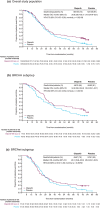Olaparib as maintenance treatment for patients with platinum-sensitive relapsed ovarian cancer
- PMID: 31205507
- PMCID: PMC6535754
- DOI: 10.1177/1758835919849753
Olaparib as maintenance treatment for patients with platinum-sensitive relapsed ovarian cancer
Abstract
Poly (ADP-ribose) polymerase (PARP) inhibitors were developed with the intention of treating patients with homologous recombination repair deficiency (HRD), specifically for patients with tumours that harbour a BRCA mutation (BRCAm). Evidence from clinical trials to date has demonstrated that patients with a BRCAm derive the greatest benefit from PARP inhibitors. However, clinical studies have also shown that PARP inhibitors provide benefit to women with ovarian cancer who do not have a BRCAm. The recent updated approvals of olaparib, niraparib and rucaparib by the US Food and Drug Administration and the European Medicines Agency for the treatment of all platinum-sensitive relapsed (PSR) ovarian-cancer populations, regardless of their BRCAm status, support this. Long-term tolerability and efficacy of olaparib have been demonstrated in patients both with and without a BRCAm, with 13% of patients receiving maintenance olaparib for at least 5 years in one study, which is unprecedented in the relapsed ovarian-cancer setting (versus 1% on placebo). Further studies should be performed to elucidate which non-BRCAm patients are deriving benefit and what molecular processes are enabling this, so that patients continue to receive optimal treatment for their disease. Here, we review clinical and molecular markers of HRD, the long-term clinical safety and efficacy of PARP inhibitors in ovarian cancer, with a focus on olaparib and the current approved indications for PARP inhibitors, as well as guidance on treatment decisions for patients with PSR ovarian cancer.
Keywords: PARP inhibitor; niraparib; olaparib; platinum-sensitive relapsed ovarian cancer; rucaparib; targeted therapy.
Conflict of interest statement
Conflict of interest statement: Jonathan A. Ledermann has attended AstraZeneca, Clovis Oncology, Pfizer and Roche Advisory Board Meetings and received lecture fees from these companies. He has received research funding from AstraZeneca and Merck/MSD. Eric Pujade-Lauraine has attended AstraZeneca, Clovis, Pfizer, Roche and Tesaro Advisory Board Meetings, has received travel support from AstraZeneca, Roche and Tesaro, is Chair for ARCAGY Research and is a consultant for Menarini.
Figures




References
-
- European Medicines Agency. Lynparza recommended for approval in ovarian cancer. Press release, http://www.ema.europa.eu/ema/index.jsp?curl=pages/news_and_events/news/2... (2014, accessed 3 July 2018).
-
- Pommier Y, O’Connor MJ, de Bono J. Laying a trap to kill cancer cells: PARP inhibitors and their mechanisms of action. Sci Transl Med 2016; 8: 362ps17. - PubMed
Publication types
LinkOut - more resources
Full Text Sources

